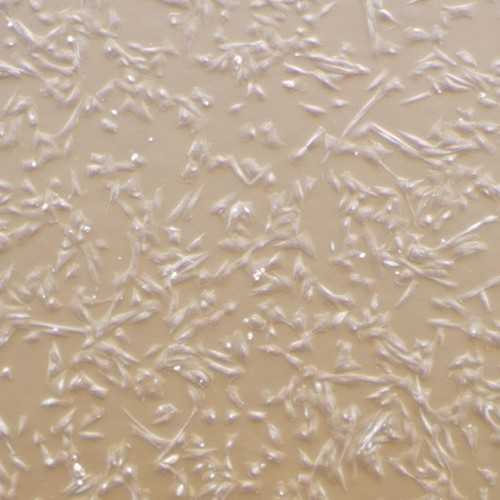Canine Hemangiosarcoma Cell Line (JHE)
JHE is a canine hemangiosarcoma cell line derived from a tumor in the heart of a 12-year old neutered male Golden Retriever with disseminated, metastatic disease. It grows in vitro.
Hemangiosarcoma is a rapidly growing, highly invasive variety of cancer, occurring commonly in dogs. It is a sarcoma arising from the lining of blood vessels. A frequent cause of death is the rupturing of this tumor, causing the patient to rapidly bleed to death.
From the laboratory of Jaime F. Modiano, VMD, PhD, University Minnesota, Twin Cities.
JHE is a canine hemangiosarcoma cell line derived from a tumor in the heart of a 12-year old neutered male Golden Retriever with disseminated, metastatic disease. It grows in vitro.
Hemangiosarcoma is a rapidly growing, highly invasive variety of cancer, occurring commonly in dogs. It is a sarcoma arising from the lining of blood vessels. A frequent cause of death is the rupturing of this tumor, causing the patient to rapidly bleed to death.
From the laboratory of Jaime F. Modiano, VMD, PhD, University Minnesota, Twin Cities.
This product is for sale to Nonprofit customers only. For profit customers, please Contact Us for more information.
| Product Type: | Cell Line |
| Name: | JHE |
| Cell Type: | Hemangiosarcoma |
| Accession ID: | CVCL_5I40 |
| Organism: | Dog |
| Source: | Heart |
| Morphology: | Spindle |
| Biosafety Level: | 2 |
| Subculturing: | Split 1:2-1:4 when cells reach ~80% confluence |
| Growth Conditions: | Ham's F12, 10% FBS, 0.05mg/ml ECGS, 0.01mg/ml heparin, 10mM HEPES Buffer, 100ug/ml Primocin |
| Cryopreservation: | 90%FBS/10% DMSO |
| Mycoplasma Tested: | Yes |
| Storage: | Liquid nitrogen |
| Shipped: | Dry ice |
- Kim JH, Frantz AM, Anderson KL, Graef AJ, Scott MC, Robinson S, Sharkey LC, O'Brien TD, Dickerson EB, Modiano JF. Interleukin-8 promotes canine hemangiosarcoma growth by regulating the tumor microenvironment. Exp Cell Res. 2014 Apr 15;323(1):155-64.
- Rodriguez AM, Graef AJ, LeVine DN, Cohen IR, Modiano JF, Kim JH. Association of Sphingosine-1-phosphate (S1P)/S1P Receptor-1 Pathway with Cell Proliferation and Survival in Canine Hemangiosarcoma. J Vet Intern Med. 2015 Jul;29(4):1088-97. doi: 10.1111/jvim.13570. Epub 2015 Jun 25.
- Lin W, Modiano JF, Ito D. Stage-specific embryonic antigen: determining expression in canine glioblastoma, melanoma, and mammary cancer cells. J Vet Sci. 2017 Mar 30;18(1):101-104. doi: 10.4142/jvs.2017.18.1.101. PubMed PMID: 27456773; PubMed Central PMCID: PMC5366293.
If you publish research with this product, please let us know so we can cite your paper.


